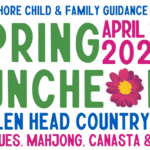Roslyn Heights, NY, November 27, 2017 — It’s a scenario that is far too common: Someone makes the difficult decision to seek out professional help for a mental health problem for themselves or their loved one and is faced with a myriad of roadblocks, including a lack of providers who take their insurance and demand cash only—or even if they find a therapist in their plan, the provider has an enormously long waiting list or is not accepting new clients at all.
North Shore Child & Family Guidance Center (also known as the Guidance Center) led an effort to assess these problems with Project Access, in which approximately 650 Long Islanders were surveyed about their experiences in trying to obtain help. The results will be announced at a press conference at the Guidance Center’s Roslyn Heights headquarters on Monday, December 11 at 10 a.m.
Expected to be speaking are New York State Senators Elaine Phillips and Todd Kaminsky; Janet Susin, Past President of the National Alliance on Mental Illness (NAMI) Queens/Nassau; and Rebecca Sanin, President of the Health and Welfare Council of Long Island.
“This report verifies what we have long known: Insurance companies and the government are not living up to their responsibility to provide people with quality, affordable and timely mental health and addictions care,” says Andrew Malekoff, Executive Director of the Guidance Center. “Even though they are legally bound to have adequate networks of care, they fall far short of that mandate. It’s incumbent upon all of us to advocate for change. Access delayed is access denied. People’s lives are at stake.”
A few key findings:
- Almost 50% of respondents indicated that it was more difficult finding help for mental health or substance abuse/addiction problems than finding help for physical illnesses, particularly when they were in crisis.
- Nearly 40% of respondents said that their insurance company did not have an adequate number of providers.
Exacerbating the problem of individuals finding appropriate providers for mental health and addictions care is stigma and the shame it generates, notes Malekoff. “If someone’s child has cancer, they won’t hesitate to call the doctor, but because of the stigma surrounding mental health, it makes it very difficult for them to reach out. Clearly, as this study reveals, despite any
progress made in eradicating stigma, we still have a long way to go with respect to public education and mental health awareness.”
The aim of Project Access is to raise public consciousness, stimulate interaction among stakeholders and motivate New York State, through the Department of Financial Services, to carry out a thorough investigation of commercial health insurers with respect to access to care.
After reviewing the research, Project Access committee member Dr. Ilene Nathanson, Chair of the Social Work Department at LIU Post, concluded, “If the definition of insurance is protection then the gross inadequacies of our insurance system are laid bare in this study. Delays, unaffordability, outright inaccessibility – all courageously endured by human beings in need of mental health care. It is time that the insurance industry stepped up to the task of protecting.”
The study is supported by the Long Island Unitarian Universalist Fund of the Long Island Community Foundation.
For previews of the research prior to the press conference, contact Andrew Malekoff at amalekoff@northshorechildguidance.org.














